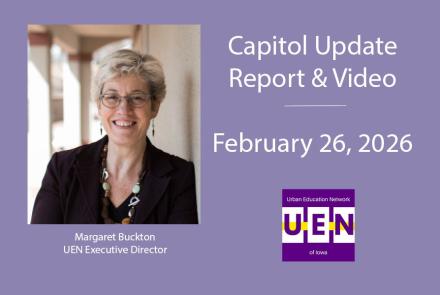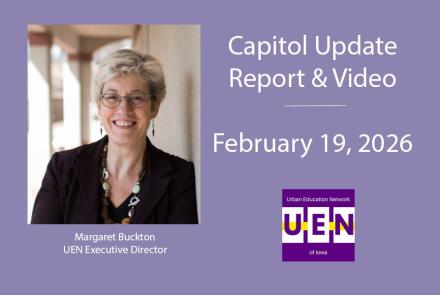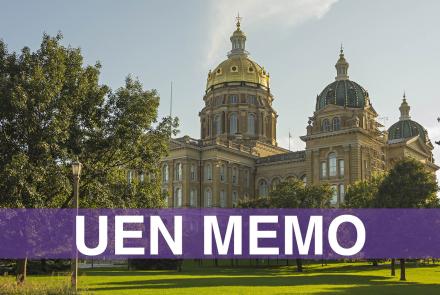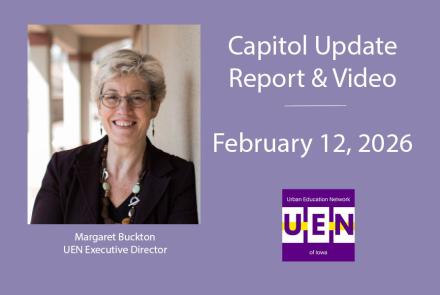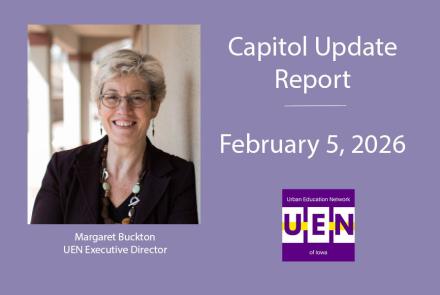Capitol Update - January 16, 2020
In this Jan. 16, 2020 UEN Report of the first week of the 2020 Legislative Session, find information about:
- Education Highlights from Governor Reynolds Condition of the State
- The Governor’s Budget Recommendation for FY 2020 and FY 2021
- Specifics about State School Aid in the Recommendation
- New Bills Introduced
- BOEE Proposed Rules on Credit Hours Required for Licensure
- Finding Biographical and Contact Information for your Legislators
- Links to members of Key Legislative Committees
- Advocacy Resources
Download the full report with Charts HERE
UEN 2020 Legislative Priorities: https://www.uen-ia.org/attachments/UEN%202020%20priorities%20final.pdf
Governor’s 2020 Condition of the State: Governor Reynolds delivered her condition of the state address on Jan. 14. Iowa Public Radio has video of the speech here: https://www.iowapublicradio.org/post/watch-live-gov-kim-reynolds-gives-2020-condition-state-address#stream/0 and her remarks are posted on her web site here: https://governor.iowa.gov/press-release/gov-reynolds-delivers-condition-of-the-state
As we are starting a new decade, Gov. Reynolds looked back 10 years: “When this body met in January 2010, our unemployment rate was 6.4 percent. Our state faced a near billion-dollar deficit. School funding was drastically cut and Iowans were worried about their future. A decade later, the condition of our state is truly strong. Because of the vision and tenacity of Iowans, our unemployment rate has gone from a near-record high to a record low. Instead of cutting school budgets, we’re cutting taxes. Our cash reserves are full, wages are going up, and Iowans once again believe we’re headed in the right direction.”
Her comments included the following references to education:
- “I’ve also directed the Department of Human Services to remove barriers that are restricting schools from partnering with telehealth providers, especially for behavioral health. What used to be a 70-mile drive in the middle of the school day can now be a walk down the hall. That means more children will receive the care they need, with less disruption to their education”.
- “I’m requesting that we appropriate an additional $15 million and adjust our state match so we can continue to leverage private and federal funding to build out broadband to every part of Iowa, making us the most connected state in the nation. Broadband also supports our world-class education system. And if there’s something Iowans have always understood, it’s that there is no better path to opportunity than a quality education.”
- “We have strong local control, rooted in communities and parents who care deeply about educating their children. We have the highest high-school graduation rate in the country and more highschoolers taking college courses than any other state.”
- “We’ve made remarkable progress in recent years on putting a new focus on STEM—and opening doors in elementary, middle, and high schools for students to explore fields that will best equip them to be the innovators who build tomorrow’s economy. Computer science has quickly moved from a narrow elective to a basic skill that every student needs.” She recognized Osage Community Schools for their vision and work in expanding computer science for their students. She went on to say, “Currently, almost two-thirds of school districts teach computer science in middle and high school. And about half teach it in elementary school. We need that to be 100 percent—which is why I’m calling on the Legislature to take computer science statewide and ensure every student, at every level, has access to this new basic skill.”
- “One of the best ways for students to learn is through hands-on experience, which is why we’re making Iowa a leader in work-based learning. In the last year alone, we’ve expanded high-school registered apprenticeships and launched the work-based learning clearinghouse, and this year will be adding $1 million for work-based learning coordinators to be covered by operational-sharing agreements.” She recognized Council Bluffs is a great example, in partnering to “create TradeWorks Academy, where high-school students work with professionals to experience what it’s like to have a career as a plumber, electrician, or mechanic.”
- “In 2019, we made historic investments in K-12 education, with over $90 million in new money, including an increase in per-pupil funding and transportation equity. The budget I’m presenting to you today makes another historic investment, with over $103 million in new funding so that Iowa schools can maintain the best teachers and classrooms in the world.”
Governor’s Budget: The following information is found in the Legislative Services Agency’s Preliminary Summary of the Governor’s Budget Recommendation, Jan. 14, 2020, found on their web site here: https://www.legis.iowa.gov/docs/publications/LAGRP/1126622.pdf
Governor Reynolds Budget Recommendation covers three fiscal years:
- FY 2020 is based on the REC December estimate, includes the December REC estimate of $8.015 billion (estimated growth rate of 2.0%), a net revenue adjustment of negative $0.3 million, and a carryforward balance from FY 2019 of $195.6 million. The Governor is also recommending supplemental appropriations for FY 2020 totaling $111.1 million, the largest shares of which is for Medicaid ($89 million) and for flood relief ($20 million). The Governor’s revised FY 2020 budget leaves an estimated surplus of $465.0 million.
- FY 2021 includes total General Fund resources of $8.474 billion based on the December REC estimate of $8.249 billion (estimated growth rate of 2.9%), net revenue adjustment of negative $7.3 million, and $232.6 million in surplus carryforward dollars. The Governor is recommending General Fund appropriations totaling $8.093 billion, which is $289.9 million below the $8.282 billion Expenditure Limitation. The Recommendation represents an increase of $342.9 million (4.4%) compared to the Governor’s revised FY 2020 appropriations recommendations. The Governor’s FY 2021 budget results in an estimated surplus of $386.5 million.
Governor’s Revenue Adjustments: The Governor’s budget includes General Fund revenue adjustments of negative $0.3 million for FY20 and negative $7.3 million for FY21 shown on page 4 of the LSA Analysis:
Medicaid: The Governor is recommending an increase of $167.0 million for FY 2021 which includes $5.0 million for the expansion of telehealth services. Table 4 on page 7 of the Analysis shows the Governor’s Recommended appropriations in order of significance:
State School Aid: The second largest appropriation increase FY 2021 is state school aid. The Governor’s recommendation for State Supplemental Assistance (state cost per pupil formerly known as allowable growth) is an increase of $95.7 million in FY 2021.
The LSA notes that the State Aid Budget recommendation sets a per pupil growth rate of 2.5%, continues the $15.0 million reduction to the AEAs, increases the Property Tax Replacement Payment (PTRP) funding per student from $110 to $131. The amount further reflects an increase of $1.0 million for the addition of work-based learning coordinators to the positions covered by operational sharing.
Mental Health and Disability Services (MHDS) Regional Services: The Governor is recommending a new appropriation for MHDS regional services to reduce the mental health property tax levy by $77.1 million and to provide an additional $3.5 million in funding for the regions.
State Children’s Health Insurance: The Governor is recommending an increase of $21.8 million in FY 2021 for the State Children’s Health Insurance Program. The increase is mainly due to the phase-out of the enhanced Federal Medical Assistance Percentage (FMAP) rate received under the federal Affordable Care Act. Other changes include an adjustment to the regular FMAP rate, as well as increases for enrollment, administrative expenses, and the reinstatement of the federal health insurer fee.
Regents Institutions: The Governor is recommending a total increase of $15.0 million for FY 2021 for the Board of Regents. The majority of the appropriation increase will be used to provide a 3.0% General Aid increase to each of the Universities:
Broadband Grants: The Governor is recommending an increase of $10.0 million from the General Fund for broadband grants in FY 2021 as part of the Governor’s Empower Rural Iowa Initiative to increase the State’s match for broadband projects. In FY 2020, an appropriation of $5.0 million was provided from the General Fund following a $1.3 million appropriation from the Rebuild Iowa Infrastructure Fund (RIIF) in FY 2019.
Transportation Equity Fund: The Governor is recommending a General Fund appropriation of $24.5 million to the Transportation Equity Fund, an increase of $5.5 million compared to FY 2020. The Transportation Equity Fund was created to provide additional funding to school districts for public school transportation costs that exceed the statewide adjusted average cost per student.
Community Colleges General Aid: The Governor is recommending a General Fund appropriation of $5.2 million for State Aid to Community Colleges in FY 2021, which is also a 2.5% increase.
The Taxpayer Relief Fund was changed through SF 2417 tax reform in the 2018 session, removing the $60 million cap of surplus funds that can be transferred to the state’s general fund, beginning July 1, 2020. Iowa Code section 8.57E, as amended by SF 2417, requires the moneys in the Taxpayer Relief Fund to only be used for tax relief pursuant to an appropriation by the General Assembly. Table 7 from page 12 of the LSA analysis shows the estimated surplus that will be directed to the fund annually from FY 2019 to FY 2021 based on the Governor’s Budget Recommendation.
Combined Reserve Funds: The reserve funds are established in Iowa Code sections 8.55 and 8.56. These Iowa Code sections set maximum limits on the total amount that can accumulate in each of the funds. Together, the combined balances cannot exceed 10.0% of the State’s adjusted revenue estimate in a given fiscal year. The Governor’s FY 2021 budget recommendations include combined reserve fund balances of $824.1 million which is the maximum. Chart 2 from page 11 of the analysis shows reserve fund balances over time, including the budget years that were negatively affected by economic recessions when the reserve funds were used to offset General Fund appropriation reductions.
Tax Credits: Another factor influencing General Fund revenues is tax credits claimed against personal income and corporate income. The Department of Revenue publishes information on State tax credits in the Tax Credits Contingent Liabilities Report. The tax credits are available to tax filers. In some cases, any person or business meeting the eligibility criteria can claim a credit. When there is a “cap” on the credit, there is a maximum amount that may be claimed either in one year or over a period of years. Table 8 from page 13 summarizes the actual tax credits that were claimed against State taxes from FY 2017 through FY 2019. This table shows the impact of the largest tax credits annually, including the School Tuition Organization Tax Credit (STO) which was expanded to a cap of $15 million in the 2019 Session.
Medicaid, School Aid, and Property Tax Replacement Long Term Trends:
- Medicaid is experiencing the fastest rate of growth in the state’s General Fund, which annually comprises approximately 19.0% of the total General Fund budget. From FY 2010 to FY 2019, the General Fund appropriation for Medicaid increased by $750.9 million, representing an average annual increase of 8.1% over the 10-year period. For FY 2020, the Governor is recommending a supplemental appropriation of $89.0 million to fully fund the projected need for the Program at an estimated $1.516 billion. For FY 2021, the Governor is recommending a Medicaid appropriation of $1.594 billion, which is an increase of $78.0 million compared to the Governor’s revised FY 2020 funding level.
- State School Aid comprises the largest portion of the General Fund budget at nearly 41.9%, and therefore it accounted for the largest dollar increase from FY 2010 to FY 2019. State School Aid increased by a total of $1.064 billion from FY 2010 to FY 2019, representing an average annual increase of 4.6%. The Supplemental State Aid growth rate for FY 2020 was set at 2.06%, resulting in an estimated appropriation increase of $78.4 million (2.4%) compared to FY 2019.
- Property tax replacement has grown considerably. From FY 2005 to FY 2011, appropriations for property tax replacement were funded from non-General Fund sources. The funding for these programs was moved back to the General Fund in FY 2012 and totaled $145.5 million. By FY 2019, these appropriations had increased to $476.0 million (6.2% of total appropriations), largely due to the enactment of SF 295 (Commercial Property Tax Act) in 2013. The legislation phased in reductions to Iowa’s commercial and industrial property taxes over a four-year period (FY 2015 to FY 2018) and created two standing General Fund appropriations designed to reimburse local governments for the reduced property tax revenue.
In this chart from the LSA Analysis Page 15, the relative size of these three significant areas is shown for FY 2019:
Education Appropriations Budget Detail: The detail of the education budget contains two areas:
- PK-12 Education Budget – the Governor’s FY 2021 Recommendation for this area is $3,490,670,812, which is an increase of $106,639,385. Within the PK-12 budget area, a majority of line-items are status quo funding with no change compared to FY 2020, except for the following areas receiving an increase:
- An increase of $95.7 million for State Foundation School Aid, for a total of $3.381 billion.
- An increase of $5.5 million for Transportation Equity, for a total of $24.5 million
- A new appropriation of $2.7 million for ICN Part III Leases and Maintenance
- An increase of $900,000 for Children’s Mental Health School-Based Training and Support for a total of $3.0 million
- An increase of $600,000 for the Statewide Education Data Warehouse from the state General Fund rather to replace the same amount in FY 2020 from the Technology Reinvestment Fund.
- An increase of $500,000 for Jobs for America’s Graduates, for a total of $3.2 million.
- An increase of $400,000 for the Future Ready Iowa Summer Joint Enrollment Program, for a total of $1.0 million.
- An increase of $249,824 to the Iowa Reading Research Center, for a total of $1.55 million.
- An increase of $105,118 for the Department of Education Administration for a total of $6.1 million.
- Student Achievement/Teacher Quality, Career and Technical Education Administration, and Attendance Center Performance/Website received smaller increases, at $9,251, $7,993 and $2,725 respectively.
- Higher Education: the Governor is recommending an increase of $27.9 million, which includes a 5.0% increase for the College Student Aid Commission, a 2.5% increase for Community Colleges and a 3.2% increase for the Board of Regents Universities.
Next Steps: The Joint Education Appropriations Subcommittee will schedule a meeting to hear explanation of the Governor’s budget recommendations by LSA staff. The combined House and Senate Appropriations Subcommittees will craft their own budgets which may or may not reflect the Governor’s budget recommendations, but are still required to live within the 99% expenditure limitations according to the December REC estimate (or the March estimate if that is lower than December). Those bills will work their way to agreement between the two chambers, then to the Governor’s desk for her signature or veto. The Governor has line-item veto authority for appropriations bills.
Meanwhile, any tax reform works its way through the House and Senate Ways and Means Committees and if there are changes in revenues resulting from legislative action for FY 2021, the Expenditure Limitation would be adjusted accordingly.
Stay tuned for more detail as the budget and tax bills progress through the chambers.
UEN Bill Registrations
The following bills have already been introduced or are still alive from the 2019 Session and have been assigned a new subcommittee, which is an indication they are likely to experience conversation in the 2020 Session. If UEN Legislative Priorities address our registration, you’ll see a registration already declared as in support, undecided or opposed. For those issues not addressed in our legislative platform, we encourage your feedback on what our registration should be, but in the meantime, will indicate a monitoring registration.
Bills from 2019:
SCR8 Fine Arts Study: this resolution was approved in the 2019 Session by the Senate Education Committee but did not advance in the full Senate. The Resolution requests that the Legislative Council appoint an Interim Study Committee to review the funding, staffing, PD, course offerings including arts integration courses; parent, family and community engagement measures; procurement of and access to instructional materials and state priorities for fine arts education in broader school improvement efforts and specifies membership of the Committee. A new subcommittee of Sens. Kraayenbrink, Cournoyer and Quirmbach is assigned. UEN is monitoring this bill.
SF 116 Firearms on School Grounds: this bill would allow an individual with a permit to carry a firearm to have the firearm in their possession if the person is on the grounds of the school for the purpose of transporting another person to or from school or delivering an item to or from the school, and if the person remains in a parking area or driveway designed for a motor vehicle. UEN is opposed to this bill.
SF 199 Voluntary Diversity Open Enrollment: this bill was approved in the 2019 Session by the Senate Education Committee but did not advance in the full Senate. The bill would prohibit the five school districts with voluntary diversity plans from regulating open enrollment out of the district based on those plans. The districts impacted include Des Moines, Davenport, Postville, Waterloo and West Liberty. A subcommittee of Sens. Behn, Zaun and Quirmbach is assigned. See last year’s March 1 UEN Call to Action on school choice, the last third of which pertains to this proposal on voluntary diversity plans. UEN is opposed.
SF 376 MH/Suicide Prevention Education: This bill was approved in the 2019 Session by the Senate Education Committee but did not advance in the full Senate. A Subcommittee of Sens. Sinclair, Behn and J. Smith is assigned. This bill adds age-appropriate and research-based information regarding mental health awareness, coping skills, and suicide prevention to the health curriculum for 7-8th grade and 9th-12th grade. UEN is registered in support.
SF 439 DOE Rules: This bill was approved in the 2019 Session by the Senate Education Committee but did not advance in the full Senate. A Subcommittee of Lofgren, J. Smith, Sweeney is assigned. The bill places the burden of proof on the DE if a school board initiates judicial proceedings challenging the rule or if the DE initiates proceedings to enforce the rule, requiring the DE to establish that the rule is explicitly authorized by the laws of the general assembly or by federal law. These provisions apply notwithstanding language in the Iowa administrative procedure Act that specifies that the burden of proof in such proceedings is on a party asserting invalidity of agency action. UEN is registered in support of this bill.
SF 480 Virtual Snow Days: This bill was approved in the 2019 Session by the Senate Education Committee but did not advance in the full Senate. A Subcommittee of Sens. Sinclair, Behn, Wahls is assigned. The bill requests an Interim Student Committee to study the feasibility of allowing a day of virtual instruction to count as a minimum school day when inclement weather causes schools to close. The bill requires the committee to study current virtual offerings in Iowa, other state practices, barriers to successful virtual instruction in this circumstance, and best practice. The bill allows the Committee to consider other alternatives to virtual instruction for snow days. UEN is registered as undecided.
SF 639 Government Lobbying: A new Subcommittee of Sens. Chapman, Bisignano, and R. Smith is assigned. This bill requires any political subdivision, defined as a county, city, township, community college, AEA or school district, that contracts directly for lobbying services, to use an RFP process, limits the contract to no more than 5 years, at which time, a new written RFP process must be engaged. If an entity either contracts for or employs a person to lobby, the entity is required to post within two weeks of the end of the fiscal year, the full contract online, all payments pursuant to the contract or if an individual is employed, total annual compensation and total number of hours spent in lobbying activity. The bill also requires a political subdivision with its own lobbyist or any organization representing political subdivisions to post lobbyist registrations and the bill history of any bill and amendment upon which the entity or individual was registered to lobby within two weeks of the end of the fiscal year. Lastly, the bill provides that documents and records relating to lobbying on or behalf of a political subdivision are public records subject to Code chapter 22 (examination of public records), and are not subject to any exception to the public records law contained in Code section 22.7. UEN is registered opposed to this bill.
New Bills Introduced
SF 2004 Online Learning: This bill would resurrect the Iowa Learning On-line Initiative, provide for a $500,000 appropriation for ILO in FY 2021 and future years, and require the initiative to include a course in Chinese. A Subcommittee of Kraayenbrink, Cournoyer, Wahls is assigned. UEN is registered as undecided.
SF 2009 School License Driving: This bill would change the criteria for a student with a minor drivers’ license for extracurricular activities, instead of being restricted to activities within the district of enrollment or a district contiguous to that, the requirement would be no more than 50 miles from point of origin to the activity. A Subcommittee of Cournoyer, Brown, J. Smith met on Wednesday afternoon to consider the bill. We suggested a limiting amendment to only allow the minor-licensed student to drive to such activities if no transportation is provided by the school, which they seemed amendable to include. Sens. Cournoyer and J. Smith signed the report to move forward to committee with amendment. Sen. Brown wants to determine impact on students that live in districts bordering other states first, before signing. UEN is registered as undecided.
SF 2015 Cardiac Arrest Student Athletes: This bill requires the athletic associations, in collaboration with the DPH to develop guidelines and materials regarding sudden cardiac arrest, defines symptoms, allows districts to have informational meetings with students/parents/coaches at the beginning of the activity, requires districts and nonpublic schools to distribute materials to student athletes and obtain signature from parents regarding review of the materials, requires removal from participation if a student exhibits symptoms, and requires districts to provide annual training for coaches. A senate subcommittee of Sens. Johnson, Cournoyer and Wahls has been assigned. UEN is registered as undecided.
BOEE Proposed Rules: ARC 4870C -- Teaching Endorsement Changes
https://www.legis.iowa.gov/docs/aco/arc/4870C.pdf
The BOEE is proposed changes to the course workload required for teaching endorsements. The above link allows you to review the proposal, but basically completely eliminates some content and shortens the number of hours needed in order to meet licensure requirements in others. Take a look and let us hear feedback. UEN has a priority to eliminate barriers to licensure and to take steps making it easier for districts to attract and retain appropriately credentialed instructors, so are very encouraged to see the BOEE taking this step. The public hearing is scheduled for Feb. 5, 2020, at 1:00 PM at the Board Room, 701 East Court Avenue, Suite A, Des Moines Iowa, 20319. Comments may also be submitted in writing to Kimberly Cunningham, BOEE, kim.cunningham@iowa.gov no later than February 7, 2020 at 4:30 PM.
Connecting with Legislators: Find biographical information about legislators gleaned from their election web sites on the ISFIS site here: http://www.iowaschoolfinance.com/legislative_bios Learn about your new representatives and senators or find out something you don’t know about incumbents.
Find out who your legislators are through the interactive map or address search posted on the Legislative Website here: https://www.legis.iowa.gov/legislators/find
You can click on any Senator or Representative within the Legislative website to find their office phone and email address or search the Iowa Secretary of State’s general election candidate list for all House members and those Senators who were elected in November of 2018 to see their home address, local phone or cell phone number and email address. That list is found here: https://sos.iowa.gov/elections/pdf/candidates/generalcandidatelist.pdf
To call and leave a message at the statehouse during session, the House switchboard operator number is 515.281.3221 and the Senate switchboard operator number is 515.281.3371. You can ask if they are available or leave a message for them to call you back.
Key Committee Contacts (every name is linked to their legislative email address within the table):
|
Senate Education Committee: Amy Sinclair (R, District 14), Chair Chris Cournoyer (R, District 49), Vice Chair Herman C. Quirmbach (D, District 23), Ranking Member Jerry Behn (R, District 24) Claire Celsi (D, District 21) Jeff Edler (R, District 36) Eric Giddens (D, District 30) Craig Johnson (R, District 32) Tim Kraayenbrink (R, District 5) Mark S. Lofgren (R, District 46) Ken Rozenboom (R, District 40) Jackie Smith (D, District 7) Annette Sweeney (R, District 25) Zach Wahls (D, District 37)
|
Senate Ways and Means Committee: Jake Chapman (R, District 10) Dan Dawson (R, District 8), Vice Chair Pam Jochum (D, District 50), Ranking Member Jerry Behn (R, District 24) Joe Bolkcom (D, District 43) Waylon Brown (R, District 26) Jim Carlin (R, District 3) William A. Dotzler Jr. (D, District 31) Jeff Edler (R, District 36) Randy Feenstra (R, District 2) Eric Giddens (D, District 30) Herman C. Quirmbach (D, District 23) Jason Schultz (R, District 9) Roby Smith (R, District 47) Annette Sweeney (R, District 25) Zach Wahls (D, District 37)
|
Senate Appropriations Committee: Michael Breitbach (R, District 28), Chair Tim Kraayenbrink (R, District 5), Vice Chair Joe Bolkcom (D, District 43), Ranking Member Claire Celsi (D, District 21) Mark Costello (R, District 12) William A. Dotzler Jr. (D, District 31) Julian B. Garrett (R, District 13) Thomas A. Greene (R, District 44) Dennis Guth (R, District 4) Craig Johnson (R, District 32) Carrie Koelker (R, District 29) Mark S. Lofgren (R, District 46) Liz Mathis (D, District 34) Mariannette Miller-Meeks (R, District 41) Amanda Ragan (D, District 27) Ken Rozenboom (R, District 40) Tom Shipley (R, District 11) Amy Sinclair (R, District 14) Todd E. Taylor (D, District 35) Zach Wahls (D, District 37) |
|
House Education Committee: Cecil Dolecheck (R, District 24), Chair Tedd Gassman (R, District 7), Vice Chair RasTafari I. Smith (D, District 62), Ranking Member Holly Brink (R, District 80) Molly Erin Donahue (D, District 68) Tracy Ehlert (D, District 70) Ruth Ann Gaines (D, District 32) Mary Ann Hanusa (R, District 16) Lindsay James (D, District 99) David Kerr (R, District 88) Monica Kurth (D, District 89) Mary Mascher (D, District 86) Heather Matson (D, District 38) Norlin G. Mommsen (R, District 97) Sandy Salmon (R, District 63) Jeff Shipley (R, District 82) Sharon S. Steckman (D, District 53) Skyler Wheeler (R, District 4) Cindy Winckler (D, District 90)
|
House Ways and Means Committee: Lee Hein (R, District 96), Chair Joe Mitchell (R, District 84), Vice Chair Dave Jacoby (D, District 74), Ranking Member Jane Bloomingdale (R, District 51) Timi Brown-Powers (D, District 61) Gary L. Carlson (R, District 91) Mary A. Gaskill (D, District 81) Chris Hagenow (R, District 19) Dustin D. Hite (R, District 79) Steven Holt (R, District 18) Bruce Hunter (D, District 34) Charles Isenhart (D, District 100) Lindsay James (D, District 99) Megan Jones (R, District 2) Bobby Kaufmann (R, District 73) Monica Kurth (D, District 89) Jeff Kurtz (D, District 83) Dave E. Maxwell (R, District 76) Charlie McConkey (D, District 15) Amy Nielsen (D, District 77) Anne Osmundson (R, District 56) David Sieck (R, District 23) Skyler Wheeler (R, District 4) Mary Lynn Wolfe (D, District 98) Louie Zumbach (R, District 95) |
House Appropriations Committee: Gary M. Mohr (R, District 94) Chair Holly Brink (R, District 80) Vice Chair Chris Hall (D, District 13), Ranking Member Bruce Bearinger (D, District 64) Liz Bennett (D, District 65) Brian Best (R, District 12) Jacob Bossman (R, District 6) Dave Deyoe (R, District 49) Cecil Dolecheck (R, District 24) John Forbes (D, District 40) David Kerr (R, District 88) John Landon (R, District 37) Mary Mascher (D, District 86) Norlin G. Mommsen (R, District 97) Kirsten Running-Marquardt (D, District 69) Mike Sexton (R, District 10) Ray Sorensen (R, District 20) Phyllis Thede (D, District 93) Dave Williams (D, District 60) John H. Wills (R, District 1) Cindy Winckler (D, District 90) Gary Worthan (R, District 11) |
Advocacy Resources:
To find Advocacy Resources such as Issue Briefs, UEN Weekly Legislative Reports and video updates, UEN Calls to Action when immediate advocacy action is required, testimony presented to the State Board of Education, the DE or any legislative committee or public hearing, and links to fiscal information that may inform your work, visit the UEN legislative web page here: http://www.uen-ia.org/legislation.htm
Contact us with any questions, feedback or suggestions to better prepare your advocacy work:
Lew Finch, UEN Executive Director Margaret Buckton, UEN Legislative Analyst
lfinch@mchsi.com margaret@iowaschoolfinance.com
319.329.0547 Cell 515.201.3755 Cell


